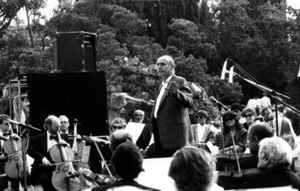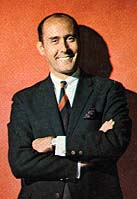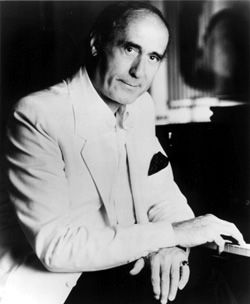 Composer/conductor/arranger
Henry Mancini was one of the most versatile talents in music. The Mancini
name, synonymous not only with great motion picture and television music,
but with fine recordings and international concert performances as well.
Composer/conductor/arranger
Henry Mancini was one of the most versatile talents in music. The Mancini
name, synonymous not only with great motion picture and television music,
but with fine recordings and international concert performances as well.
"I once referred to the music department at Universal as a salt mine. But it was a good salt mine, and younger composers in film today do not have access to that kind of on-the-job training. Being on staff there I was called upon to do everything. I mean, everything.Whenever they needed a piece of source music, music that comes from a source in the picture, such as a band, a jukebox, or a radio, they would call me in. I would do an arrangement on something that was in the Universal library, or I would write a new piece for a jazz band or a Latin band or whatever. I guess in every business you have to learn the routine--in film scoring, the cliches--before you can begin to find your own way. "
 Composer/conductor/arranger
Henry Mancini was one of the most versatile talents in music. The Mancini
name, synonymous not only with great motion picture and television music,
but with fine recordings and international concert performances as well.
Composer/conductor/arranger
Henry Mancini was one of the most versatile talents in music. The Mancini
name, synonymous not only with great motion picture and television music,
but with fine recordings and international concert performances as well.
He was nominated for an unprecedented 72 Grammys and won 20 awards. He was nominated for 18 Academy Awards and won four Oscars. He was also awarded with the Golden Globe Award and nominated for two Emmy Awards.
Whether it be a complete score or a featured song, Mancini lent his talents to many memorable films including Victor/Victoria, The Glass Menagerie, The Pink Panther, 10 Darling Lilli, Arabesque, Charade, Days of Wine and Roses, Hatari and Breakfast at Tiffany's.
He also wrote for a number of television films including "The Thorn Birds," and "The Shadow Box," as well as television themes including "Peter Gunn," "Mr. Lucky," "NBC News Election Night Coverage," "Newhart," "Remington Steele," and "Hotel."
Mancini recorded over 90 albums which styles varying from big band to jazz to classical to pops, eight of which were certified gold by the Recording Industry Association of America.
Mancini was a much-in-demand concert performer, conducting over fifty engagements per year. Among the symphony orchestras he conducted are the London Symphony, the Israel Philharmonic, the Boston Pops, the Los Angeles Philharmonic and the Royal Philharmonic Orchestra. He appeared in 1966, 1980, and 1984 in command performances for the Royal Family.
 Born
in Cleveland, Ohio in 1924 he was introduced to music and the flute by
his father, an avid flutist, at the age of eight. At age twelve, he took
up piano and within a few years became interested in arranging.
After graduation from high school in 1942, Mancini enrolled in New York's
famous Juilliard School of Music but his studies were interrupted by a
service draft call in 1943 where he served overseas in the Air Force and
later in the infantry.
Born
in Cleveland, Ohio in 1924 he was introduced to music and the flute by
his father, an avid flutist, at the age of eight. At age twelve, he took
up piano and within a few years became interested in arranging.
After graduation from high school in 1942, Mancini enrolled in New York's
famous Juilliard School of Music but his studies were interrupted by a
service draft call in 1943 where he served overseas in the Air Force and
later in the infantry.
Following his release from the Armed Forces in 1946, Mancini joined the Glenn Miller-Tex Beneke orchestra as a pianist/arranger. It was here that he met the future Mrs. Mancini, Ginny O'Conner, who was one of the original members of Mel Torme's "Mel-tones." They were married in Hollywood in 1947.
In 1952 Mancini joined the Universal â€"International Studios music department. During the next six years he contributed to over 100 films, most notably The Glenn Miller Story (for which he received his first Academy Award nomination), The Benny Goodman Story and Orson Welles' Touch of Evil.
Mancini left Universal-International to work as an independent composer/arranger in 1958. Soon after, he scored the television series "Peter Gunn" for writer/producer/director Blake Edwards, the genesis of a relationship, which lasted over thirty years and produced twenty-six films.
Mancini collaborated with a number of noted artists. Among those joint projects were "Momma," with Luciano Pavarotti, who was number one on the classical album charts, and "In the Pink," with flautist James Galway, which sparkled a popular Mancini/Galway concert tour in 1985. In 1986 Henry Mancini and Johnny Mathis teamed up for a tribute to the silver screen, "Mancini and Mathis-The Hollywood Musicals." That same year, he wrote one of Disney's best scores ever for The Great Mouse Detective.
 Mancini
received four honorary doctorate degrees: an Honorary Doctor of Music from
Duquesne University in Pennsylvania, an Honorary Doctor of Humane Letters
from Mount Saint Mary's College in Maryland, an Honorary Doctor of Humanities
from Washington and Jefferson College in Pennsylvania and an Honorary Doctorate
from the California Institute for the Arts in Valencia.
Mancini
received four honorary doctorate degrees: an Honorary Doctor of Music from
Duquesne University in Pennsylvania, an Honorary Doctor of Humane Letters
from Mount Saint Mary's College in Maryland, an Honorary Doctor of Humanities
from Washington and Jefferson College in Pennsylvania and an Honorary Doctorate
from the California Institute for the Arts in Valencia.
His deep love of music and support of young musicians is evident in the scholarships and fellowships he established at top music schools. Many of tomorrow's composers, conductors and arrangers have benefited from Mancini's programs at Juilliard School of Music, and on the West Coast at UCLA and USC, and at the American Federation of Music's "Congress of Strings."
Henry Mancini authored two books: "Sound and Scores-A Practical Guide to Professional Orchestration," which can be found on the shelf of virtually every serious student of music; and the autobiography, "Did They Mention Music?"
Henry Mancini passed away in 1994, but his musical legacy still survives
and will influence many generations to come.
|
||||||||||||